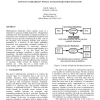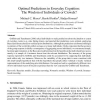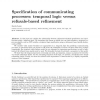613 search results - page 54 / 123 » Event Extent Estimation |
93
Voted
WSC
2001
15 years 3 months ago
2001
Multitrajectory Simulation allows random events in a simulation to generate multiple trajectories. Management techniques have been developed to manage the choices of trajectories ...
102
click to vote
NIPS
1998
15 years 3 months ago
1998
A common way to represent a time series is to divide it into shortduration blocks, each of which is then represented by a set of basis functions. A limitation of this approach, ho...
COGSCI
2008
15 years 2 months ago
2008
Griffiths and Tenenbaum (2006) asked individuals to make predictions about the duration or extent of everyday events (e.g., cake baking times), and reported that predictions were ...
122
Voted
FAC
2008
15 years 2 months ago
2008
Abstract. In this paper we consider the relationship between refinement-oriented specification and specifications using a temporal logic. We investigate the extent to which one can...
119
click to vote
IJON
2007
15 years 2 months ago
2007
Despite a steady improvement of computational hardware, results of numerical simulation are still tightly bound to the simulation tool and strategy used, and may substantially var...



